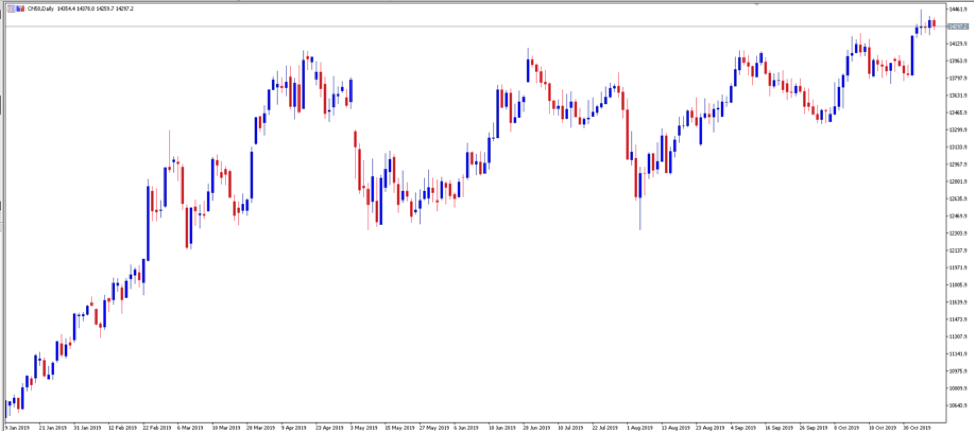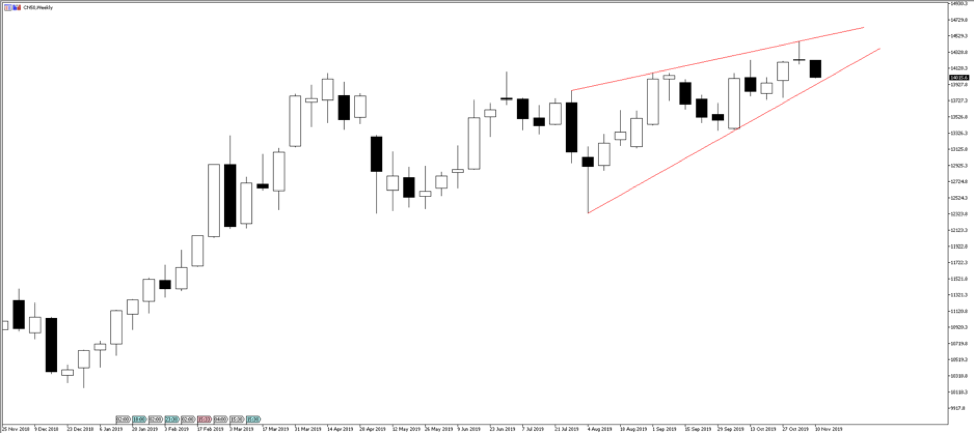- English (UK)
Analysis
The Chinese stock market looks set to be the world’s best performer this year. Access to this stock market is usually restricted to mainland residents and foreign institutional investors (QFII), but you can access this hot market with us through the FTSE China A50 Index (CN50).
Star performer
The CN50 has undoubtedly been the star performing index this year. Financial reforms in China have propelled the index markedly higher - and Beijing has plans to further reform its main exchange, permitting greater daily moves and fast-tracking the process for companies to go public. Of course, dragging trade tensions have pulled the index down along the way.
The increased weighting of Chinese large- and mid-cap stocks into the MSCI Emerging Market (EM) index would be helping. Both from a potential fund flow perspective, notably that of passive funds, but also from a semantics basis.
The outlook from here is focused on US-China trade talks. More recently, the CN50 index has been sensitive to phase one trade deal developments, falling last week when talks were further delayed, rising on the news of deal-signing and tariff rollbacks, and falling again when Trump rubbished such progress.
Just look at that performance - Starting 2019 at the 10491.0 level, the index closed last week at 14237.1. That’s a 36.3% gain since 1 January, and you can sense a clear bout of fear of missing out (FOMO) is in play.

Pinbar reversal
The bulls may have dominated through 2019, but I’d be cautious in the short-term, as looking at the CN50 weekly chart, we can see last week’s price action ended with a pinbar reversal. Over the week, the bulls tried to take price higher, but ran out of steam and exhaustion has set in, with the set-up looking somewhat more bearish in the short-term.
Not only do we have a defined wedge pattern, but we’ve seen a lower low from the pinbar reversal at the trend high.

The bearish pinbar reversal clearly playing out as news on the ‘Phase One’ deal becomes mixed. Mid-last week Beijing delivered great news for stock markets: announcing tariff rollbacks were on the cards. But on Friday, Trump rubbished the news, saying he was not interested in a full tariff reversal.
The opportunity
A pinbar reversals tend to indicate trend rejection, which implies there could be some short-term selling opportunities for the CN50.
Remember trade talks are driving markets.
The pinbar reversal might be signalling that the index will be particularly sensitive to news of deal setbacks, or is waiting for serious confirmation of deal signing before it tracks notably higher.
Of course, as Beijing continues its financial reforms and optimism holds for some sort of phase one trade deal, the long-term trend for the CN50 remains to the upside.
A lot weighs on Hong Kong too here. As the city becomes more unstable, watch money flow north out of the Hang Seng Index and into the mainland, which should further inflate the Shanghai Composite Index.
Access the Chinese stock market with Pepperstone’s CN50
You can trade this booming market with the CN50, a FTSE index of some of China’s largest listed companies, an instrument that gives Pepperstone clients access to the domestic Chinese market with 50 top A shares.
Go long or short, it’s your call, but if you have a view on China this index, along with our Hang Seng index or USDCNH (offshore yuan), offers that flexibility.
Sure the bucket of these 50 large companies is only a fraction of the entire Chinese stock market, but running a regression of the CN50 against the broader Shanghai Composite Index (SSE), we found the CN50 accounts for 89.1% of the SSE price movement.
That’s an 89% correlation in the last twelve months, and an 87% correlation in the five years to date.
Find out more about indices here
The material provided here has not been prepared in accordance with legal requirements designed to promote the independence of investment research and as such is considered to be a marketing communication. Whilst it is not subject to any prohibition on dealing ahead of the dissemination of investment research we will not seek to take any advantage before providing it to our clients.
Pepperstone doesn’t represent that the material provided here is accurate, current or complete, and therefore shouldn’t be relied upon as such. The information, whether from a third party or not, isn’t to be considered as a recommendation; or an offer to buy or sell; or the solicitation of an offer to buy or sell any security, financial product or instrument; or to participate in any particular trading strategy. It does not take into account readers’ financial situation or investment objectives. We advise any readers of this content to seek their own advice. Without the approval of Pepperstone, reproduction or redistribution of this information isn’t permitted.
